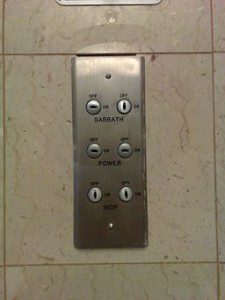I assume you don’t come from a Jewish background, so you don’t have the cultural structure in place. The structure includes the emphasis on the corporate joy of welcoming the Sabbath on Friday evenings, coupled with expectations of family and worship and play and conversation and food already prepared until the Saturday sunset.

I don’t know if you have ever heard of the “Sabbath elevator” but it is the perfect illustration. According to traditional Jewish law, lighting a fire is considered work, so any fires to be kindled have to be done before the Sabbath begins and then kept burning.
Orthodox Jewish scholars have decided that sparking an electrical circuit is today’s equivalent to lighting a fire, so adherents must refrain from starting anything electrical. This includes punching elevator buttons.
As a result, many high-rise buildings in Israel and other parts of the world with concentrations of Orthodox Jews have programmed their elevators to automatically stop at every floor on the Sabbath.
It may be a bit of an irritant to an impatient, non-Sabbath person who accidentally stumbles into one of those elevators. However, look at the other side and see the societal support for Sabbath: people are in this together. It becomes a community glue, a common practice, an exercise in trust.
The practice of Sabbath emphasizes the active pursuit of God in worship and community. It’s not meant to be a day of boring nothingness or endless “don’t’s.”
Instead, Sabbath offers life-infusing rest and love and stillness and joy and peace. It means leaving behind economic pursuits and competition with others and trusting God that you and those around you can find satisfaction in less physical stuff and in more soul-competence.
Truly, “sabbathing” is a luxury. One of the challenges entirely too many people face today is the lack of “slack” in our lives. “Slack” means space, flexibility, the ability to let down our guard for a while. Without it, whether there is no slack in finances, time, rest or emotional energy, life seems to endlessly and exhaustedly spiral downward.
Think of slack like white space on a page. An attractive printed page has white space, spots of quietness so the story or photo can be highlighted. A life with no “white space” is exhausting on every level.
An intentional, regularly practiced, no-excuses-permitted Sabbath puts the white space back into our lives.
Sabbath stands in opposition to the frantic screaming for attention surrounding us. It invites the joy of a book, a long story, a meandering walk, a simple meal shared with friends and family, games around a table.
Sabbath welcomes others to share that meal, to tell their stories, to play, to worship, or even nap with us, to rekindle love and care to the body and soul.
Sabbath says, “I have enough and I offer thanks to God for that gift.
Sabbath says, “It is time to lighten my soul and offer forgiveness and freedom to others.”
Sabbath says, “Be more aware of the world around us and how interdependent we are.” Perhaps your appliances would like a break. Perhaps the folding of laundry can be a joint joy, a time to thank your clothes for having done their work all week.
Move away from the “what” and into the “why” of Sabbath and see the mystery unfold.
An extra thought:

















